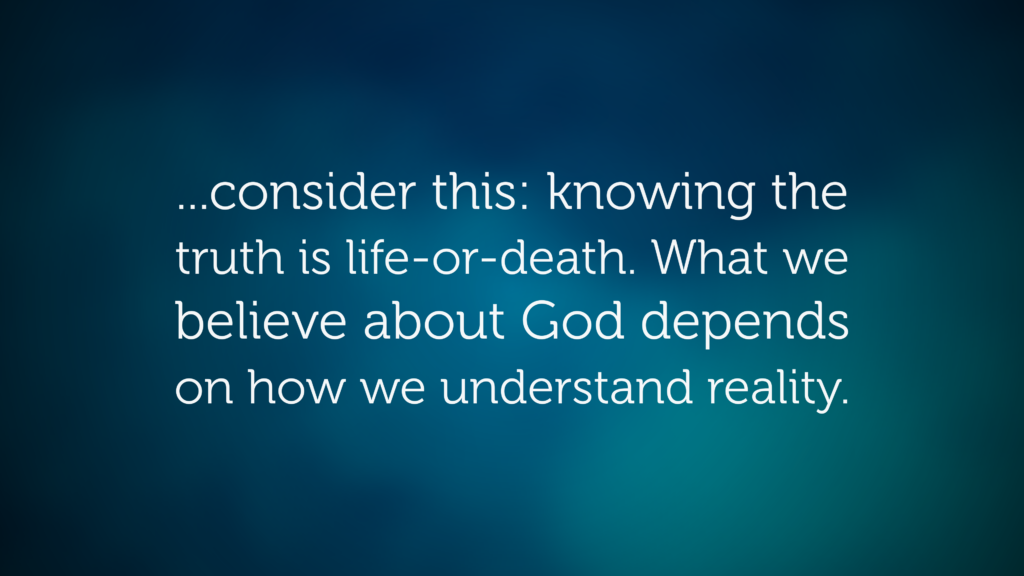15 Nov Tips for Discerning Truth (Part 1)
With a plate full of turkey, sweet potatoes, rolls, and green beans with too much bacon for an average day, you take a seat between your sister and the uncle you haven’t seen for a few years. The table is full of people, family (at least by title), coming together on this day from spending most days in separate worlds. Your sister casually shares a controversial thought… and silence blankets the room. Just a moment later, voices, opinions, and even shame are hurled across the table and when it’s all over, you’re left wondering why we bother gathering at all. Your sister tells you later that she never meant to start a debate! What she said was so obvious. Didn’t everyone know this?
Perhaps the truth is not as obvious as we believe it is.
If you don’t believe me, just glance at a friend’s social media feed. This is an era where our individual realities are curated by algorithms intended to keep our attention with no regard for what is true or not. Misinformation runs rampant. Shocking half-truths are amplified in the virtual realm and then leak into the physical world. Lies have existed since the snake tempted Eve, but never in history has our shared truth been so limited.
How can we be sure that a shared reality, a shared truth, is even possible? God is the creator of all things1 and the author of all truth. In His wisdom, God designated truths to create the physical order–the gravitational constant, the laws of conservation of mass and energy. Justice, and the social order that comes with it, cannot exist without truth but God has designated that truth too, revealed through His Word. The order of the universe and the pervasive recognition of justice point to the original, God-created, shared reality that can and will be restored.
As followers of Jesus, we are to value truth because God values truth. It’s part of His very character: God cannot lie, go back on His word, or contradict Himself,2 He is the perfect judge and shows no partiality.3 And it isn’t limited to God; it’s an integral part of His perfect design for creation, shared with us here and now. And if we are to value truth, if we are to image God in that way, it is absolutely necessary for us to discern truth. How can we say we value something we cannot even recognize?
Scripture instructs us to “examine everything carefully; hold fast to that which is good; abstain from every form of evil.”4 God specifically calls us to discern the truth, and for good reason. For believers, discerning truth is critical for our sanctification and for our witness. Paul opens his letter to Titus explaining that he serves “to further the faith of God’s elect and their knowledge of the truth which leads to godliness, “5 and continues to connect the upright behavior of believers with the truth they hold.

If that wasn’t enough reason to practice discerning truth, consider this: knowing the truth is life-or-death. What we believe about God depends on how we understand reality. This is why the enemy attacks with lies!6 The lies we let in alter the way we understand reality, which alters our beliefs and our faith. Altered beliefs result in altered actions that are inefficient at best, but sinful and destructive at worst, leading to death. The enemy attacks with lies because a false view of Christ has the power to prevent someone from placing their faith in Him and receiving His grace. The truth doesn’t just make someone wise. The truth saves.
Luckily, we aren’t left to ourselves with this life-or-death task of discernment. In fact, we couldn’t discern truth on our own even if we tried.7 The author of all truth is eager to share the truth with us8 and He empowers us to recognize it by the power of His Holy Spirit.9 “His divine power has given us everything we need for life and godliness through our knowledge of him who called us by his own glory and goodness.”10 When we know God, we can know truth.
Though the Holy Spirit working in us provides the ability to discern truth, we are still responsible for part of the work. We may simply pray, “Lord, show me the truth! I’m hungry for your wisdom!” expecting God to inject magical discernment powers into us. But there is a reason we call it “practicing discernment.” It is a journey in which we meet God with our questions, invite Him to participate in our investigation, and position ourselves to listen to His answers. Then another question comes, and we do it all over again.
I hope that in this post I have given you a reason to value truth and encouragement to practice discerning it! But how does someone actually do this? The Holy Spirit does its part, but what does our part of discernment look like? Join me in Part 2 here as I share practical tips for discerning the truth.
- Colossians 1:16
- Hebrews 6:18, Numbers 23:19, Titus 1:2, 2 Timothy 2:13
- Exodus 34:6-7, 1 Peter 1:17
- 1 Thessalonians 5:21-22, ESV
- Titus 1:1, NIV
- John 8:44
- Proverbs 21:30, Jeremiah 8:9, Proverbs 14:12
- James 1:5
- Philippians 2:13
- 2 Peter 1:3, ESV



